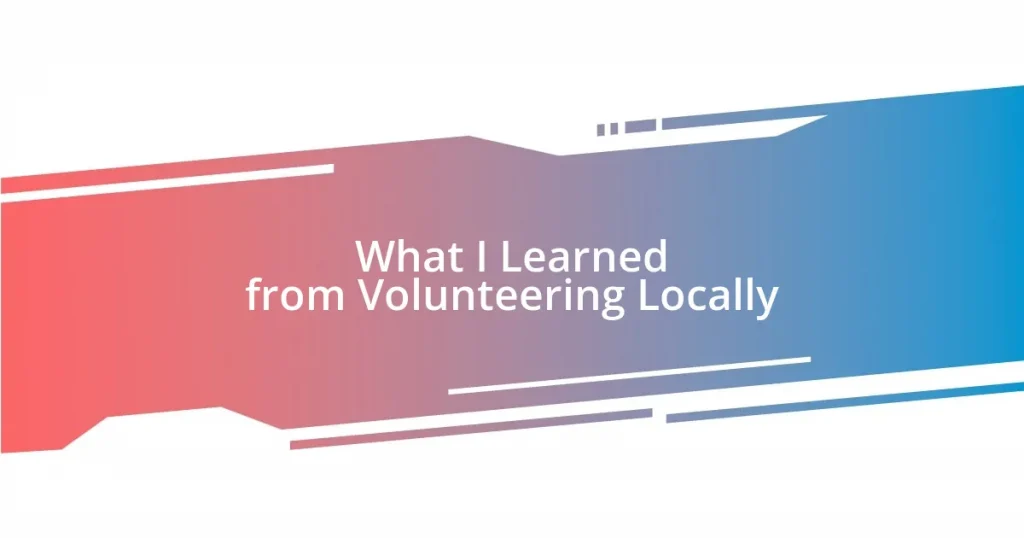Key takeaways:
- Volunteering locally fosters emotional rewards, strong community connections, and personal growth through shared experiences and understanding diverse perspectives.
- Identifying personal passions and aligning them with volunteer opportunities enhances fulfillment and impact, making service work feel meaningful.
- Adapting to challenges while volunteering, such as communication and emotional resilience, leads to greater resourcefulness and reinforces the significance of small contributions.
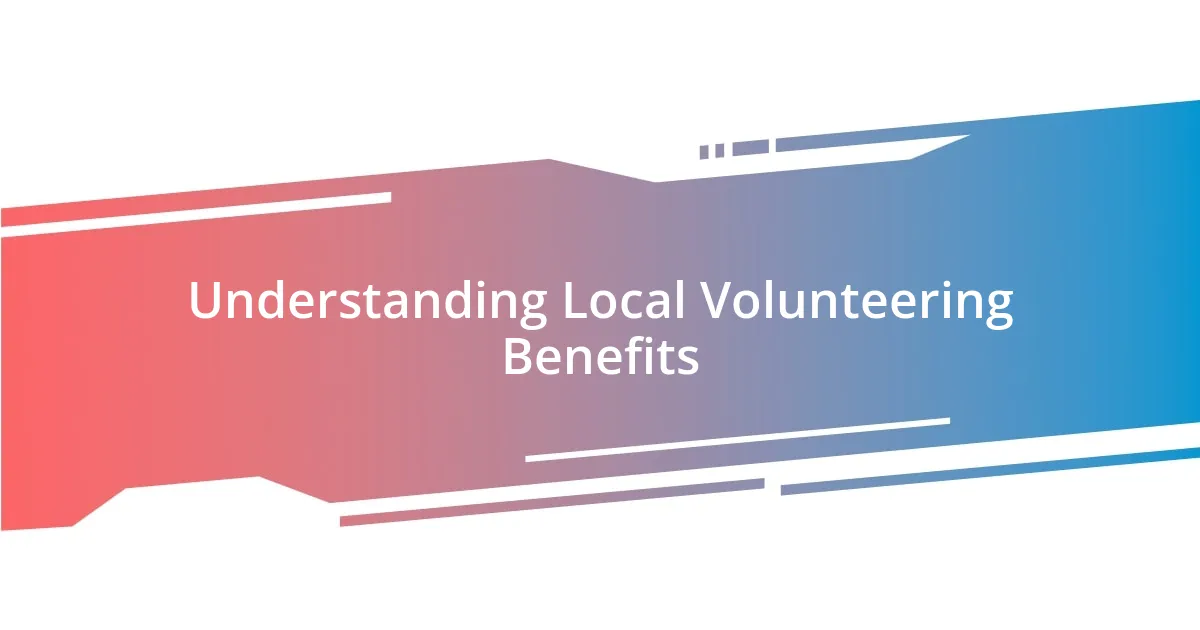
Understanding Local Volunteering Benefits
Volunteering locally opens up a world of connections that often surprises me. I remember my first day helping at a community garden; not only did I learn about sustainable practices, but I also met incredibly diverse individuals who shared their stories. Have you ever realized how a simple conversation can turn into a profound friendship?
The emotional rewards of volunteering are immeasurable. I once organized a clothing drive for families in need, and the gratitude I witnessed was beyond words. It made me reflect—when was the last time you felt genuinely appreciated? That experience filled my heart with joy and reminded me how even small acts can dramatically impact someone else’s life.
Additionally, local volunteering fosters a deep understanding of the issues in our own communities. Participating in a food bank made me acutely aware of food insecurity in my area, enlightening me on challenges that I had previously overlooked. Have you thought about how much a single experience could broaden your perspective on community needs? These insights inspire advocacy and motivate us to make lasting change.
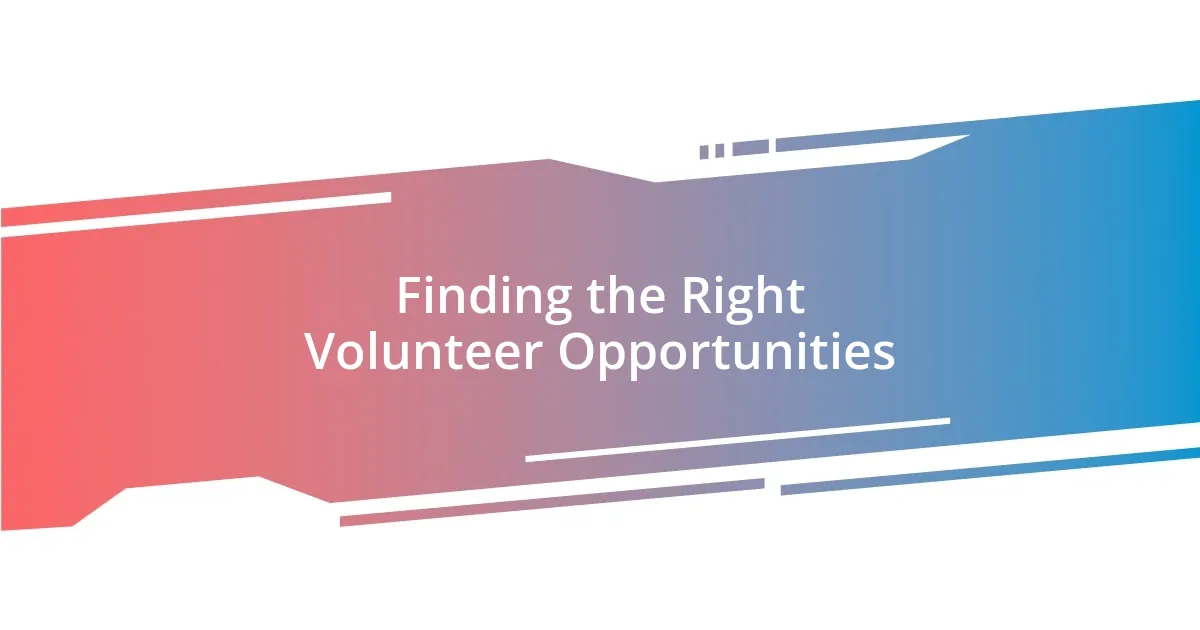
Finding the Right Volunteer Opportunities
Finding the right volunteer opportunities can often feel overwhelming, especially when so many options are available. I remember feeling that way when I first started. It helped to reflect on what I was most passionate about—animals, education, or environmental causes. By aligning my interests with available opportunities, I was able to connect with causes that truly resonated with me.
One effective strategy is to explore local organizations that align with your values. I was fortunate to stumble upon a tutoring program for underprivileged youth. It combined my love for teaching with my desire to make a local impact. Have you ever felt that thrill when you discover something that speaks to your values? That simple act made my volunteer experience not only fulfilling but also profoundly personal.
Another consideration is the time commitment and logistics involved in volunteering. For instance, I once hesitated to sign up for a beach cleanup, fearing I couldn’t give enough time. But as it turned out, even dedicating one Saturday morning helped create a tangible change. How do you prioritize your time with volunteer work? Finding opportunities that fit your schedule ensures that you can contribute genuinely without feeling overwhelmed.
| Type of Opportunity | Considerations |
|---|---|
| Animal Shelters | Passion for animal welfare, physical activity required |
| Food Banks | Addressing food insecurity, flexible hours |
| Mental Health Support | Training may be required, emotional intelligence is key |
| Schools and Tutoring | Commitment to education, potential for long-term impact |
| Environmental Initiatives | Outdoor activities, collaborative efforts are common |
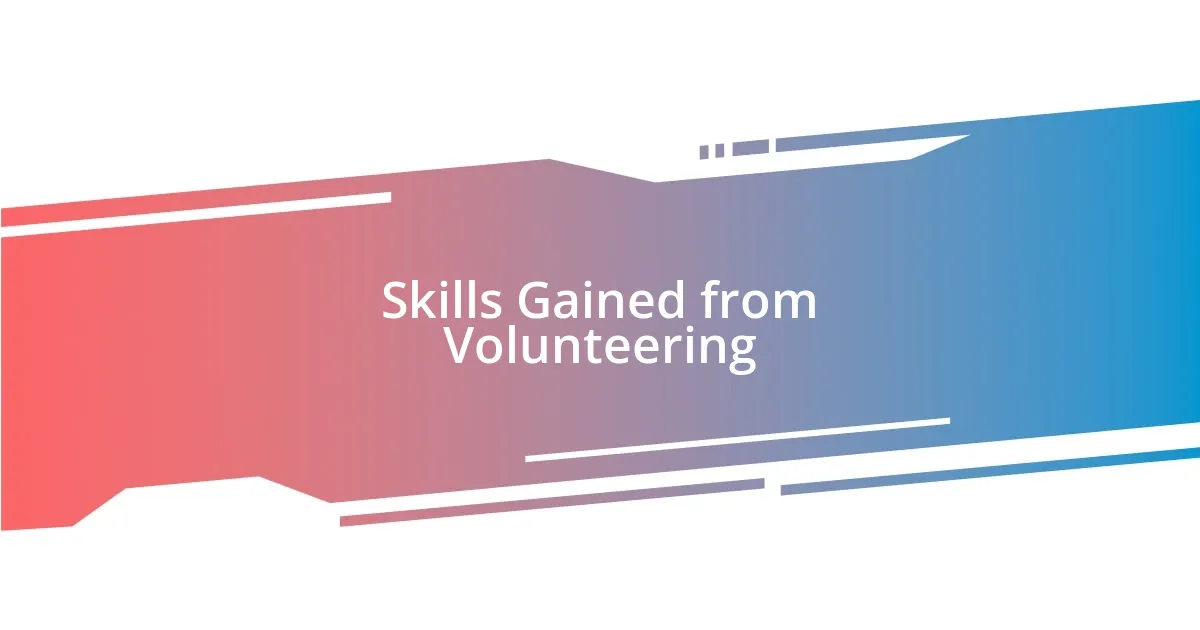
Skills Gained from Volunteering
Volunteering has taught me a range of skills that I never anticipated acquiring. One day at a local shelter, I found myself stepping into a leadership role during a team project organizing a community event. This experience not only honed my organizational skills but also deepened my ability to work collaboratively in a diverse team setting. It was empowering to witness how our different strengths could align to achieve a common goal.
Here are some key skills I gained from my volunteering experiences:
- Leadership: Managing projects and guiding teams toward objectives.
- Communication: Learning to convey ideas clearly while listening to others’ perspectives.
- Problem-solving: Navigating unexpected challenges and finding practical solutions on the spot.
- Empathy: Understanding diverse backgrounds and experiences, which has enriched my emotional intelligence.
- Time Management: Balancing multiple tasks effectively while prioritizing important deadlines.
I never imagined I’d also improve my hands-on skills through volunteering—like gardening at a local farm. Each session with the plants made me more adept not just at the physical tasks but also at the important art of patience. Witnessing how tiny seeds transform into thriving vegetables was nothing short of miraculous and taught me persistence when results aren’t immediately visible. These real-world applications provided me with a holistic skill set that I believe enhances both my personal and professional life.
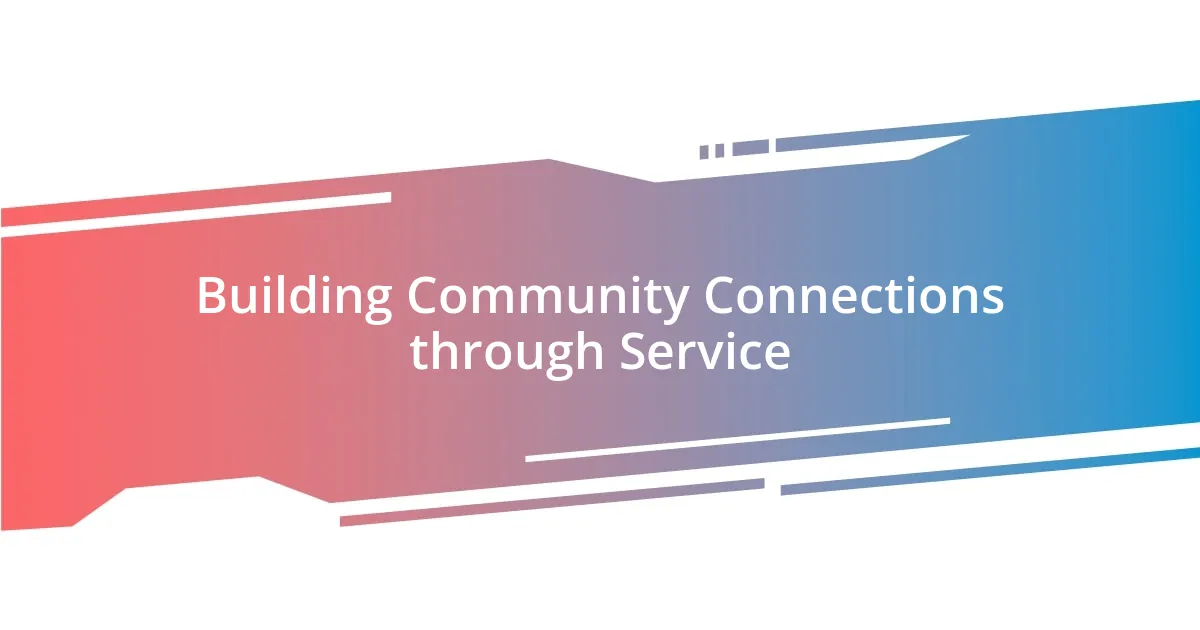
Building Community Connections through Service
Volunteering has truly opened my eyes to the power of community connections. One day while helping at a local food bank, I was struck by the camaraderie among volunteers—many had been working together for years. I could feel the genuine friendship and trust that had developed. It made me wonder, how often do we take the time to build those connections in our everyday lives? The smiles and laughter shared over packing boxes reminded me that service creates bonds that extend beyond the task at hand.
I also learned that service fosters a sense of belonging. When I participated in a community garden project, I met individuals from all walks of life. Despite our differences, we worked side by side, sharing stories and nurturing the plants together. In those moments, I realized that our shared goal brought us closer, creating an unspoken understanding. Isn’t it fascinating how a simple act of service can break down barriers? That garden became more than just a project; it was a living testament to our interconnectedness.
Reflecting on my experiences, I find that local service work offers a unique opportunity to expand one’s social network. As I volunteered with a youth mentorship program, I discovered that not only was I shaping young minds, but I was also building lasting relationships with other mentors. We collaborated, shared resources, and even celebrated each other’s successes. It made me appreciate how such connections can be pivotal in creating a supportive community. Have you ever felt that sense of support in a group project? It’s a powerful motivator that can amplify the impact of our efforts.
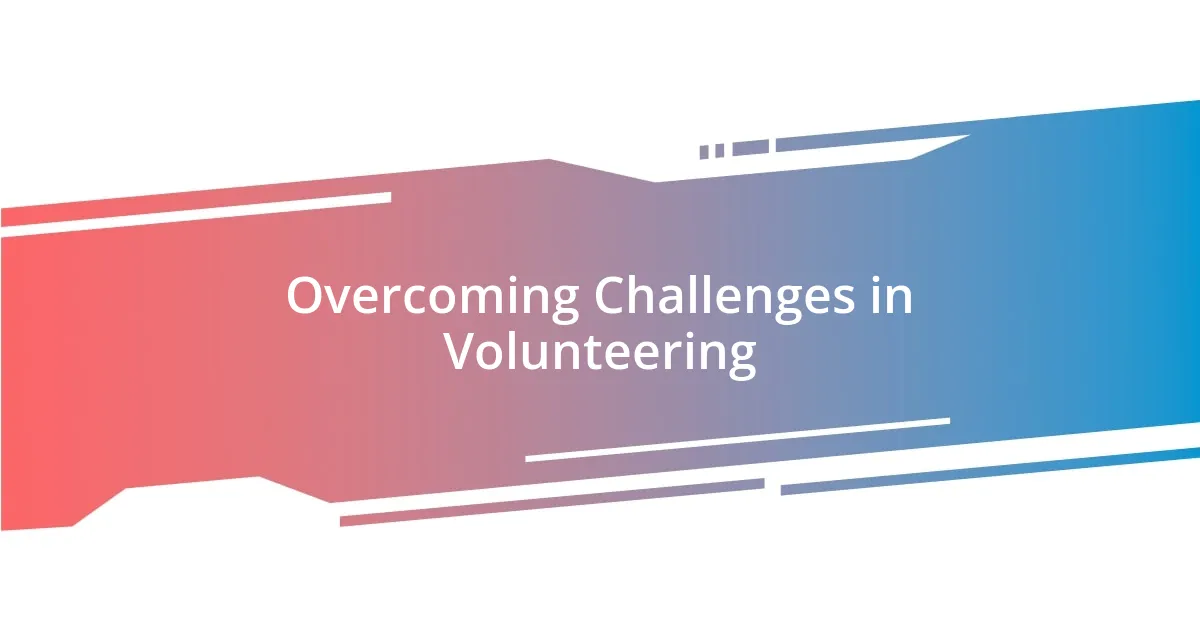
Overcoming Challenges in Volunteering
Volunteering comes with its fair share of challenges, and surprisingly, I found those tough moments to be some of the most rewarding. During a particularly hectic day at a local event, we faced staff shortages due to illness. Instead of panicking, I stepped in to fill multiple roles, juggling tasks from registration to crowd management. That experience taught me not only flexibility but also the importance of staying composed under pressure. Have you ever had to adapt in a crisis? It can truly test your resourcefulness.
I also learned that effective communication is vital when overcoming challenges while volunteering. There was an instance at a community clean-up where we got our signals crossed about meeting spots and time. This mix-up led to confusion, and at first, frustration bubbled up among the participants. However, taking a moment to clarify our objectives and check in with each team member dramatically shifted the atmosphere. It reminded me that open lines of communication can transform a potentially chaotic situation into a coordinated effort where everyone feels valued.
Lastly, the emotional aspect of volunteering often presents its own set of hurdles. When I volunteered at a local shelter, I encountered heartbreaking stories that weighed heavily on my heart. I sometimes struggled with feelings of helplessness and sadness. However, I realized that acknowledging these emotions allowed me to channel them into a deeper commitment to the cause. I began to understand that while I may not be able to change every circumstance, the small acts of kindness I offered could still make a significant difference. Isn’t that a powerful realization? Each bit of effort contributes to a wave of change, even if it doesn’t seem monumental at first.
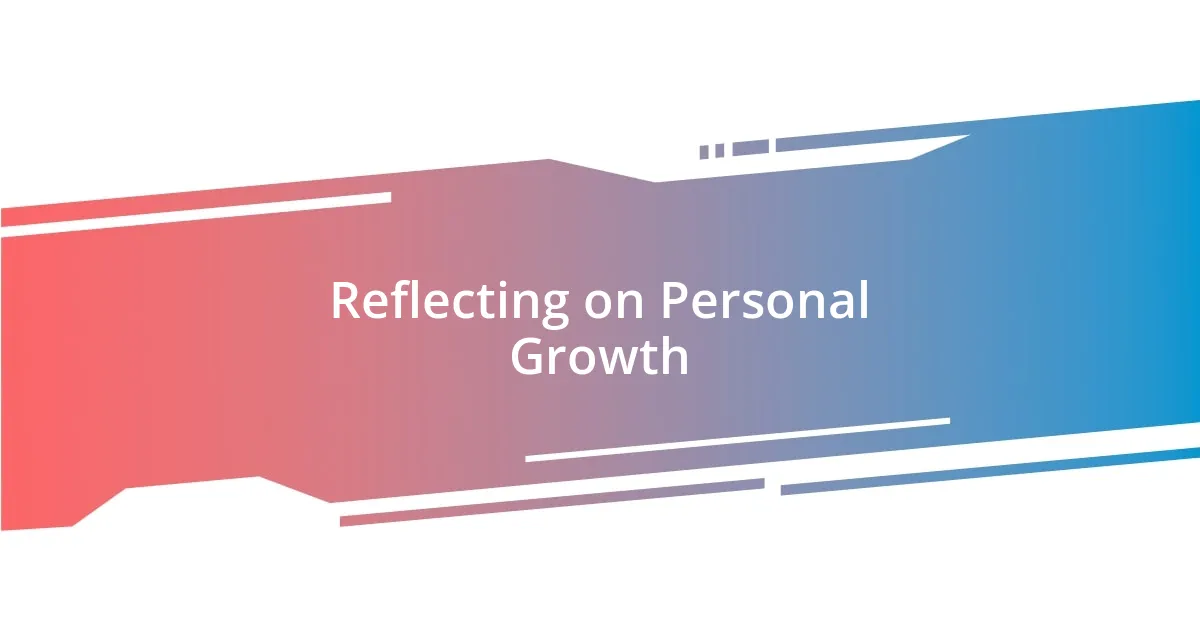
Reflecting on Personal Growth
Reflecting on personal growth through volunteering has been an eye-opening journey for me. I never realized how much I could learn about empathy until I helped at a community soup kitchen. Watching guests share their stories over a warm meal made me confront my own assumptions and biases. It forced me to see the world from perspectives I had never considered. Have you ever had a moment where your views shifted dramatically? For me, it was a moment of clarity that highlighted the richness of human experience.
One memorable instance was during a clothing drive, where I found myself sorting not just clothes but emotions. Some of the donations came with notes—letters filled with gratitude or stories of hardship. As I read through them, I felt a deep connection to the donors’ journeys. It was a profound reminder that behind every item of clothing was a story of hope or struggle. I began to appreciate the weight of those stories and understood that volunteering isn’t just about physical aid; it’s about emotional support, too.
Looking back, I can honestly say that volunteering has taught me resilience in ways I never expected. There was a period when I volunteered for a community mentorship program that felt overwhelming at times. Balancing my own life struggles while supporting others made me question my capacity to help. Yet, it was through these challenges that I learned the importance of vulnerability. Sharing my own experiences with mentees helped to forge deeper connections, creating a safe space for all of us to grow together. In what ways have you found vulnerability to be a strength in your own experiences? For me, it has become a key element of not just volunteering, but living authentically.
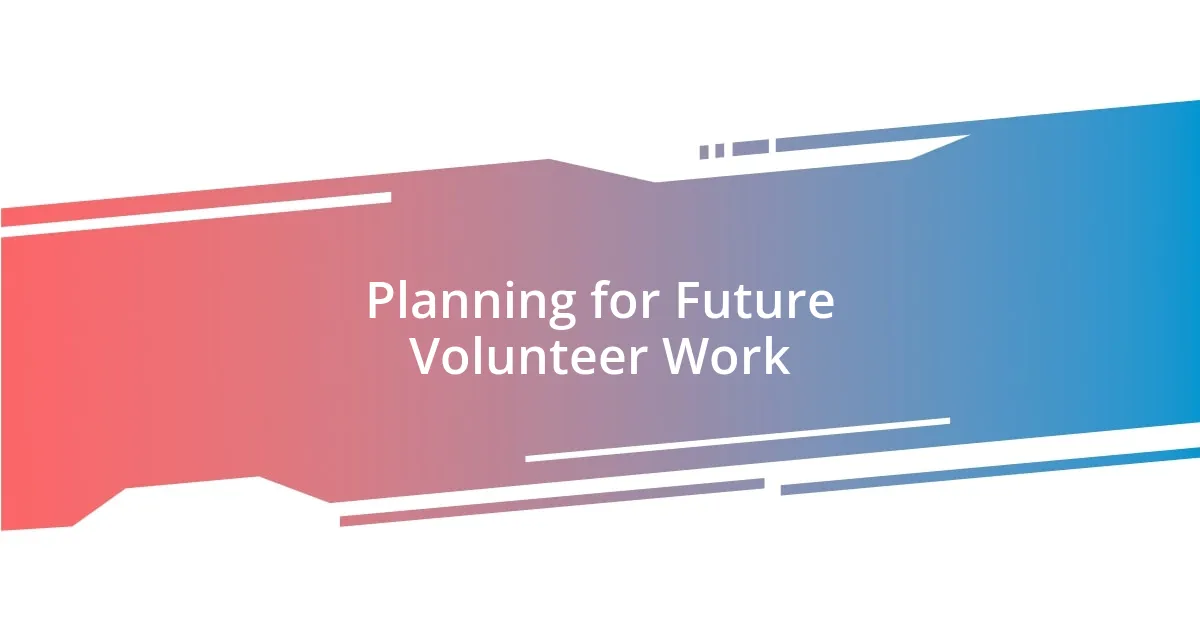
Planning for Future Volunteer Work
Planning future volunteer work is an exciting yet strategic endeavor. One of the first steps I recommend is identifying causes that personally resonate with you. For instance, I once attended an informational session at my local animal shelter, captivated by the stories shared about the animals. The passion in those volunteers’ voices sparked something in me. Have you ever felt that spark? It’s vital to choose something that ignites your passion; it makes the commitment feel less like a chore and more like a calling.
As I navigated my own volunteer journey, I realized the importance of setting realistic expectations. I once signed up for a project that aimed high but lacked adequate planning. As a result, the team was overwhelmed and morale dipped quickly. From that experience, I’ve learned to ask questions beforehand—like what resources are available or what the time commitments entail. It’s essential to gauge whether a project is manageable to ensure a fulfilling experience, not just for yourself but for all involved.
Networking with other volunteers can significantly shape your future opportunities as well. During a community event, I struck up a conversation with a seasoned volunteer. She shared insights about various organizations and even suggested collaborative projects others had successfully executed. I left that conversation brimming with ideas and connections. So, have you ever considered how impactful these dialogues can be? Engaging with like-minded individuals opens doors to fulfilling roles that align with your interests and strengths, making the experience even more enriching.










